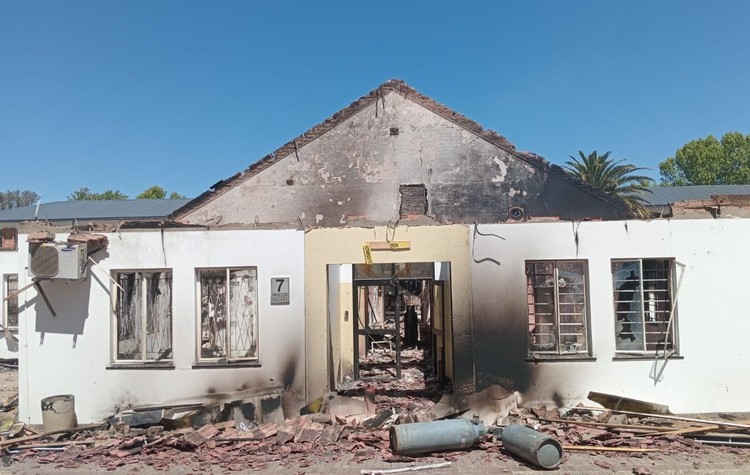Historic Fort Hare buildings torched during student protests
They are demanding the immediate resignation of Vice Chancellor Professor Sakhela Buhlungu
The main administrative offices of the University of Fort Hare in Alice were burnt down following protests by students who are demanding that Vice Chancellor Professor Sakhela Buhlungu resign. Photo: Johnnie Isaac
The University of Fort Hare in Alice and East London descended into chaos amid students protests this week.
The institution temporarily suspended academic activities after several of the buildings on campus, including the main administrative office, were torched in petrol-bomb attacks. Protests started on Monday.
In a statement, the University of Fort Hare spokesperson JP Roodt said the damage is estimated to be R250-million to R500-million.
On Thursday, students were seen lugging large bags and suitcases out of the campus gates to board taxis back to their homes, some in rural areas. Student leaders are demanding the immediate resignation of Vice Chancellor Professor Sakhela Buhlungu, accusing management of poor governance and ignoring their complaints, among other issues. They claim Buhlungu’s contract was unlawfully extended for another five years.
A key dispute with the university is about who represents the students. The protesting students are calling for elections after the university’s management tried to establish an interim Student Representative Council (SRC).
Aphelele Matinise, who was part of the former SRC, said the decision to close campuses and order students to vacate accommodations has placed an unexpected financial strain on many poor students. “They just returned from break, and they don’t have money to go back again because they last received their NSFAS allowance in September.”
“Vice Chancellor [Buhlungu] last night told students to go home [on Thursday]. We view this as an unlawful eviction. Students are panicking now because they don’t have money. Some of them come from other provinces,” said Matinise.
On Friday, students approached the court in East London to compel the university to allow students back onto campuses and residences.
Support independent journalism
Donate using Payfast

Don't miss out on the latest news
We respect your privacy, and promise we won't spam you.
Next: Pharmacists can treat people with HIV, appeal court rules
Previous: How the size of South Africa’s police force compares to other countries
© 2025 GroundUp. This article is licensed under a Creative Commons Attribution-NoDerivatives 4.0 International License.
You may republish this article, so long as you credit the authors and GroundUp, and do not change the text. Please include a link back to the original article.
We put an invisible pixel in the article so that we can count traffic to republishers. All analytics tools are solely on our servers. We do not give our logs to any third party. Logs are deleted after two weeks. We do not use any IP address identifying information except to count regional traffic. We are solely interested in counting hits, not tracking users. If you republish, please do not delete the invisible pixel.

